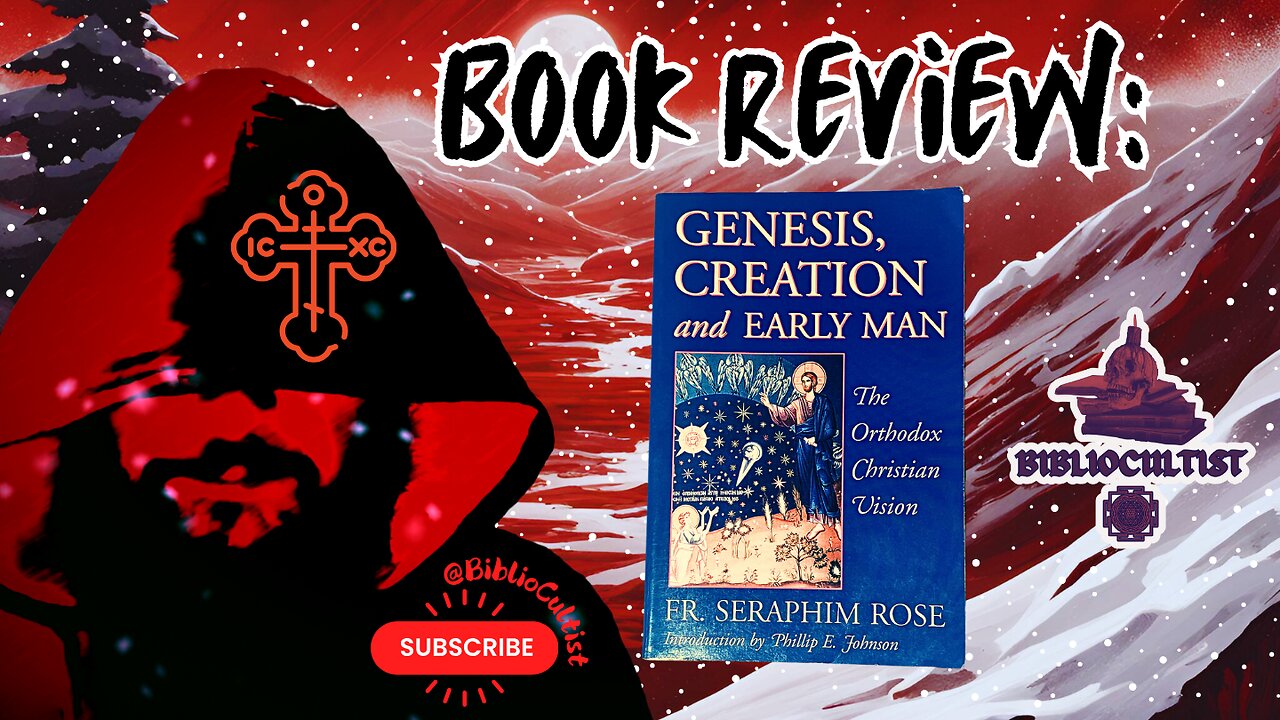Premium Only Content

Genesis REVEALED - Orthodox Truths vs Modern Lies
In this 'spoiler free' #bookreview / #bookrecommendation, I go over primary aspects of Father Seraphim Rose's 'Genesis Creation and Early Man', which presents the Orthodox Christian tradition's interpretation of the book of Genesis. I discuss how the book highlights the importance of understanding Genesis through the lens of church tradition and the writings of early church fathers, who possessed divine vision according to the author. The book critiques modern concepts like evolution, materialism, and relativism from an Orthodox perspective, arguing that a proper understanding of Genesis provides immunity against such ideas. It emphasizes the role of tradition in interpreting scripture, as the Bible itself stems from tradition. The video also mentions Father Rose's critiques of evolutionary theory and his belief that the church fathers understood Genesis literally, not just allegorically.
*all music and content copyright BiblioCultist.com*
#booktube #books #fatherseraphimrose #genesiscreationandearlyman #orthodoxchristianity #genesis #churchfathers #tradition #evolution #materialism #relativism #biblio #cultist #cult
**SHOW NOTES**
1. Fr. Seraphim Rose (1934–1982) was an American Orthodox monk, theologian, and writer who co-founded the St. Herman of Alaska Monastery in California. A convert to Orthodoxy, he became known for his writings on spiritual challenges like secularism and Eastern mysticism, emphasizing repentance and humility. Though not formally canonized, he is widely venerated as a saint by some Orthodox Christians, especially in the U.S. and Russia, where icons and prayers to him are common.
2. Divine Theoria (Θεωρία) in Greek Orthodox theology is the spiritual vision or direct contemplation of God, where divine truths are experienced beyond intellectual reasoning. Rooted in the Greek words θεάομαι (to behold) and Θεός (God), it signifies “beholding the divine” and is attained through prayer, asceticism, and the purification of the heart.
3. The Christian Bible praises traditions when they are in alignment with God’s will. A key verse is 2 Thessalonians 2:15: “So then, brothers, stand firm and hold fast to the traditions that you were taught by us, either by our spoken word or by our letter.” This verse indicates that traditions handed down through divine teaching, either orally or in writing, are to be upheld. It distinguishes these sacred traditions from the “traditions of men” criticized by Jesus in Mark 7:8-9.
4. Obligate carnivores must eat meat to survive, as their bodies rely on nutrients found only in animal flesh. For example, cats need taurine, essential for heart and eye health, while snakes and many reptiles lack the enzymes to digest plants. Without meat, they face fatal nutritional deficiencies.
5. Ontology is the branch of philosophy that studies the nature of being, existence, and reality, including the classification and relationships of entities.
6. The Western conception of original sin, especially as defined by Augustine, holds that all humans inherit the guilt of Adam’s sin, leading to a fallen nature in need of baptism for salvation. In contrast, the Eastern Orthodox Church rejects the inheritance of guilt, teaching that humans inherit a fallen nature and its consequences (e.g., death and suffering) but not the personal guilt of Adam’s sin.
7. Utopianism derives from “Utopia,” the title of Sir Thomas More’s 1516 book, which describes an idealized, fictional society. The term itself comes from the Greek words οὐ (ou, meaning “not”) and τόπος (topos, meaning “place”), signifying “no place” or “nowhere.” The suffix -ism was later added to denote the belief in or pursuit of ideal, perfect societies.
8. The word imagination comes from the Latin imaginatio, meaning “a picture, image, or representation.” It is derived from imago, meaning “image,” and the verb imaginari, meaning “to form a mental image of.” The root imago is related to the Proto-Indo-European root aim-, meaning “copy” or “likeness.” Over time, the term evolved in Middle English to refer to the mental faculty of forming images or concepts not present to the senses.
-
 LIVE
LIVE
megimu32
3 hours agoON THE SUBJECT: IRL Streamers Attacked & Nostalgic Animal Movies That Made Us Cry
428 watching -
 1:00:54
1:00:54
The Tom Renz Show
7 hours agoMore Epstein/FBI, a Scary Trade War, & the Dem Echo Chamber
7.49K1 -
 40:43
40:43
Kimberly Guilfoyle
8 hours agoDems Double Down on Delusion-Why? Live with Tony Kinnett & Bo French | Ep.202
77.8K32 -
 1:28:42
1:28:42
Redacted News
6 hours agoBREAKING! SOMETHING BIG IS HAPPENING IN EUROPE ALL OUT WAR IS COMING AGAINST RUSSIA, TRUMP FURIOUS
121K274 -
 47:50
47:50
Candace Show Podcast
6 hours agoBREAKING: Judge Makes Statement Regarding Taylor Swift's Text Messages. | Candace Ep 155
113K111 -
 1:14:23
1:14:23
Josh Pate's College Football Show
3 hours ago $0.29 earnedCFB’s Most Hated Teams | FSU & Clemson Future | Big Ten Win Totals | Star Rankings Overrated?
14.5K -
 1:33:47
1:33:47
CatfishedOnline
5 hours agoGoing Live With Robert - Weekly Recap
27.8K -
 55:18
55:18
LFA TV
1 day agoEurope’s Sudden Turn Against America | TRUMPET DAILY 3.6.25 7PM
32.2K3 -
 4:21
4:21
Tundra Tactical
4 hours ago $2.12 earnedPam Bondi MUST Enforce Due Process NOW!
23.7K1 -
 56:42
56:42
VSiNLive
5 hours agoFollow the Money with Mitch Moss & Pauly Howard | Hour 1
48K1